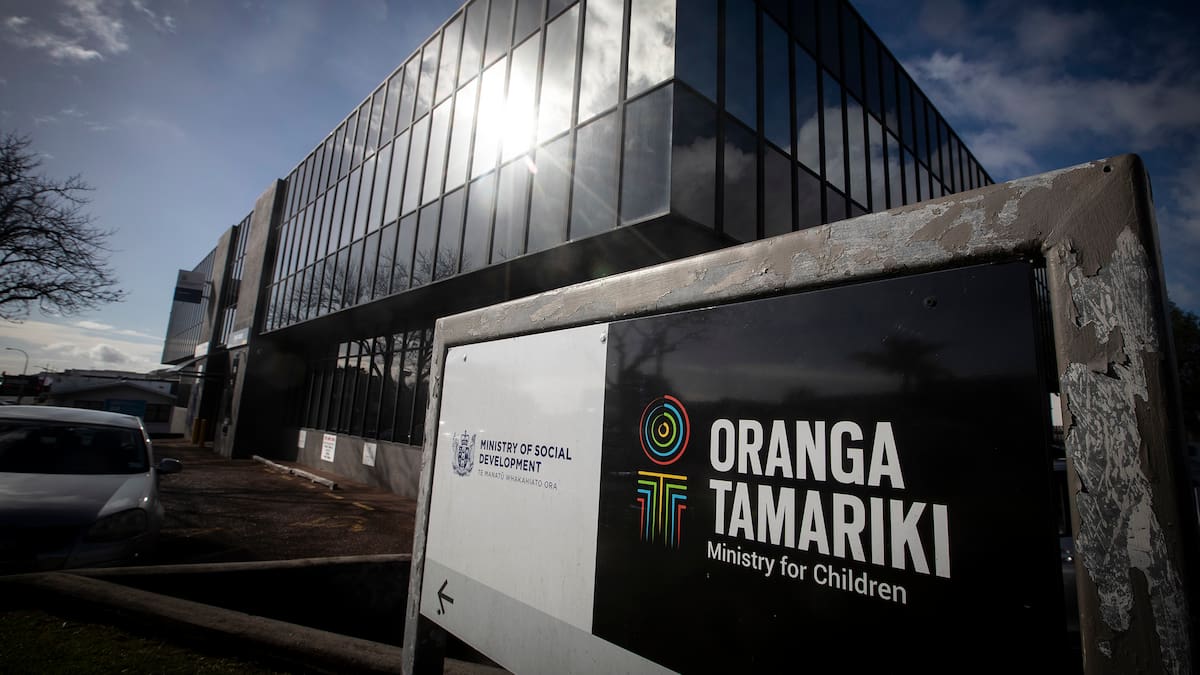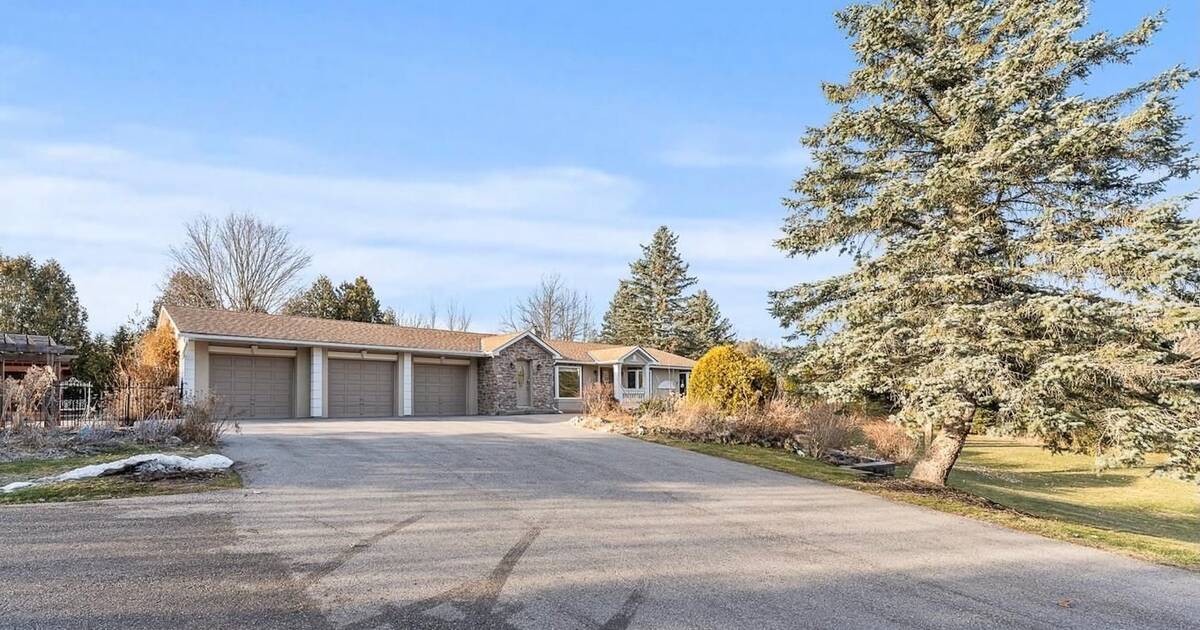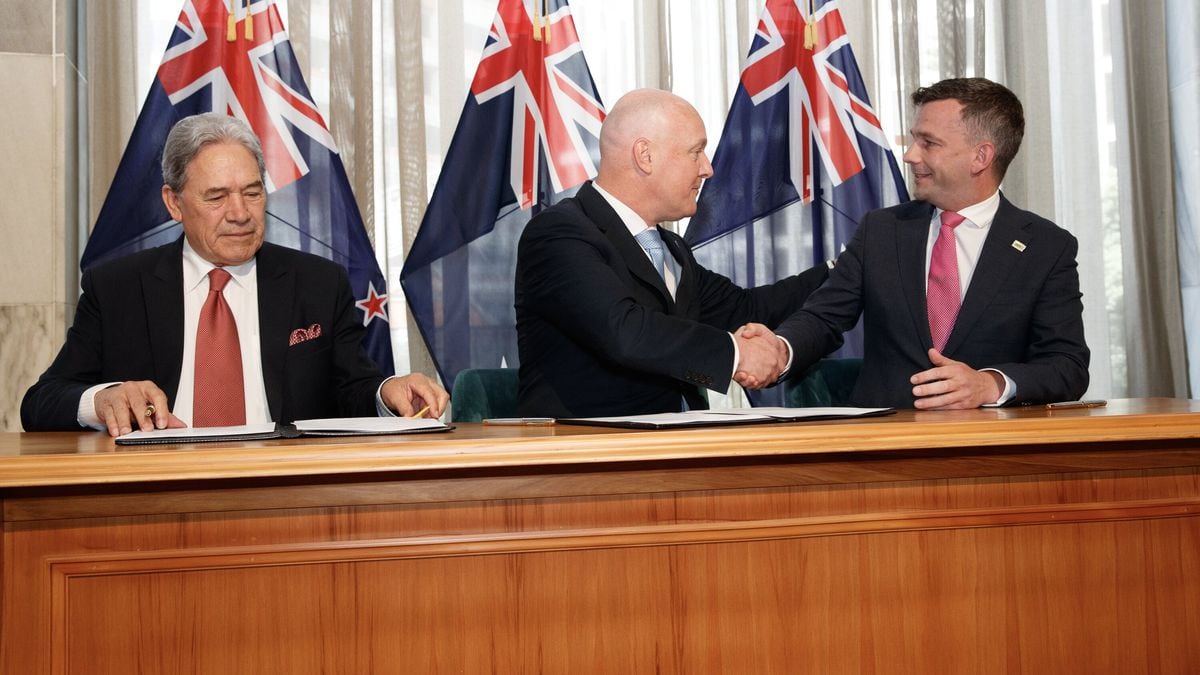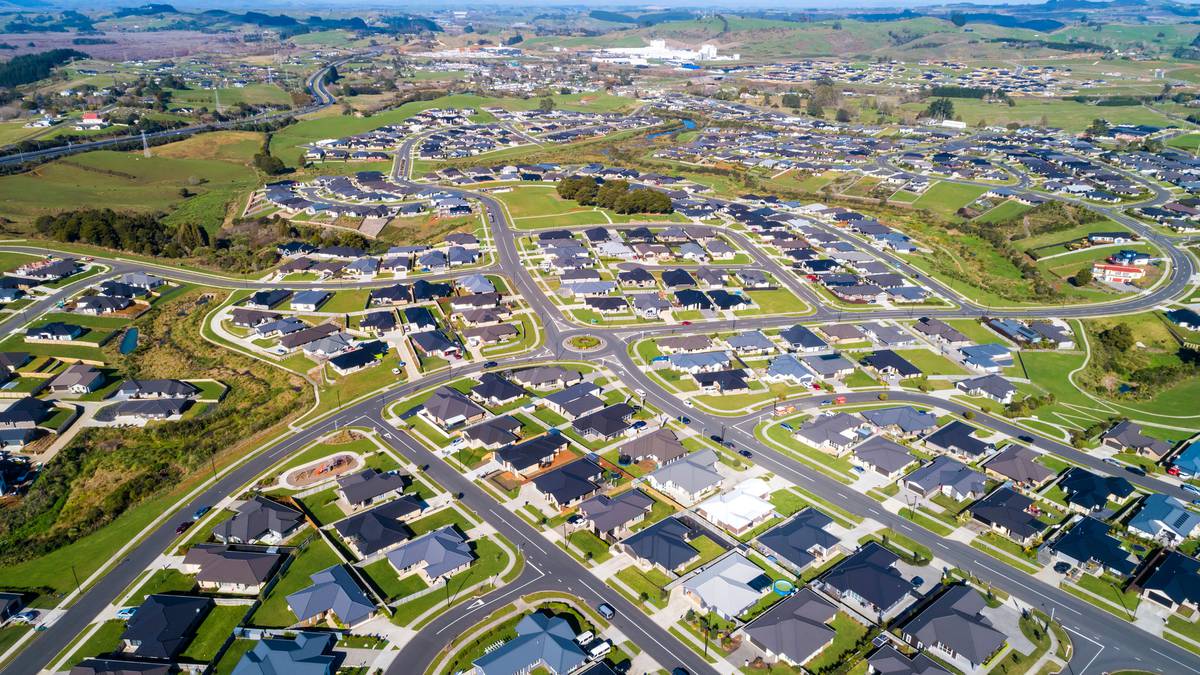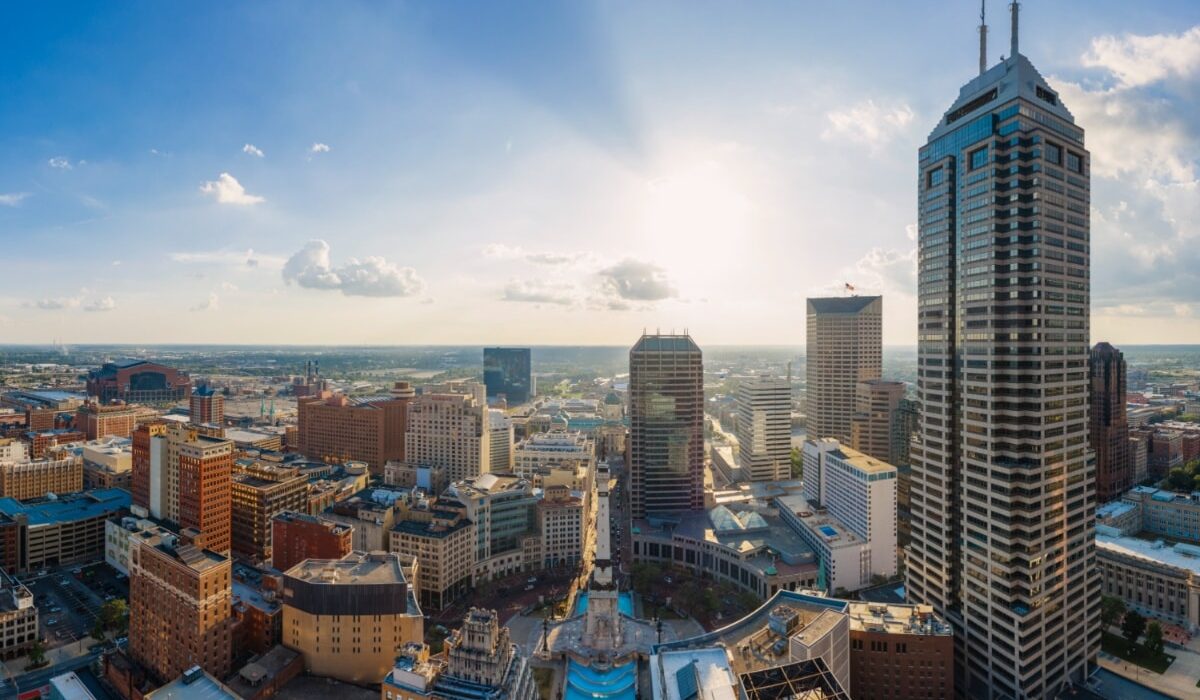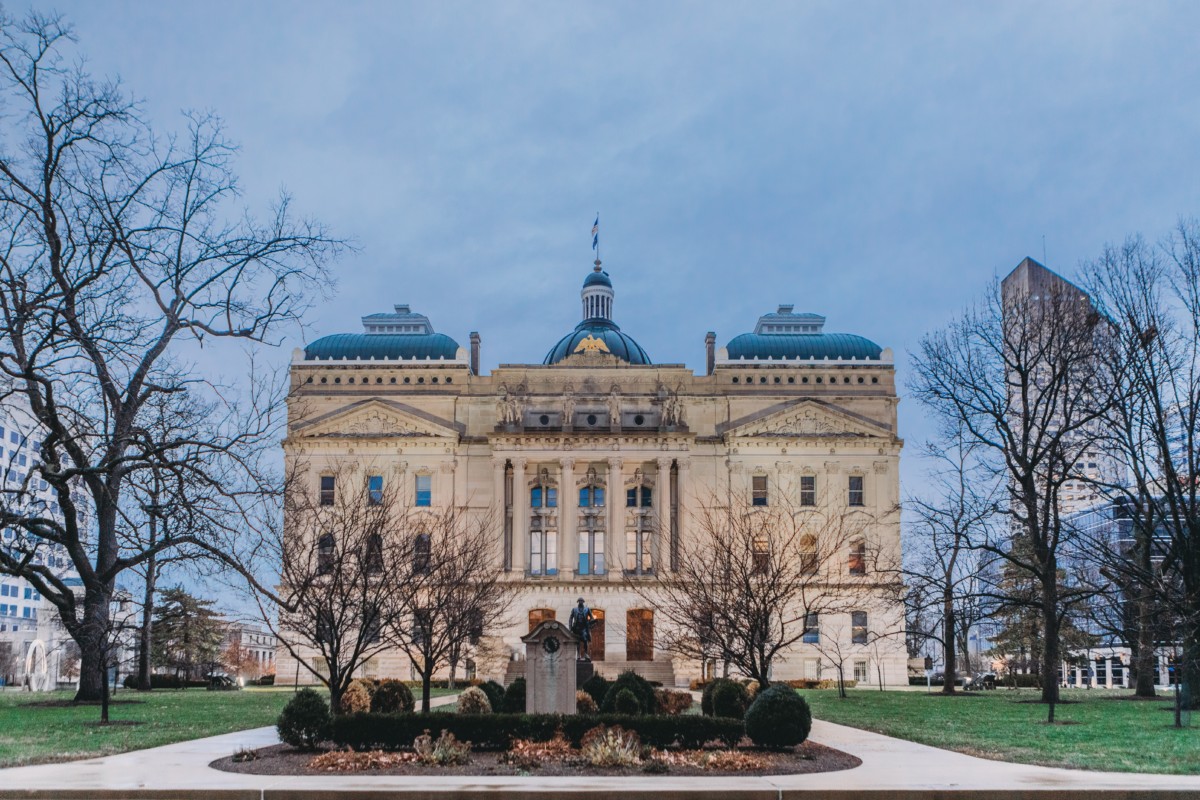Oranga Tamariki has confirmed it is working with two consultancy agencies on its restructure and change proposal, which has 447 net jobs in the firing line.
The proposal, being slammed by the Public Service Association (PSA), comes amid top-down calls to cut back dependency on the use of contractors and consultants across the sector.
Other agencies have vowed to cut back their use of contractors and consultants in their cost-saving efforts, with many ministries also taking a closer look at travel expenses and catering – in response to the Government’s ask to find savings and efficiencies.
In a statement, Oranga Tamariki deputy chief executive of people, culture, and enabling services, Caz Anderson, confirmed the two consulting firms were providing the agency with “specialist independent organisational redesign advice” that was not available internally.
The PSA fears the use of consulting firms would add extra costs to a proposal that aims to find efficiencies.
In a statement, PSA national secretary Kerry Davies hit back at the decision, said, “the Minister for Children maintains the restructure at Oranga Tamariki is all about putting children at the centre of decision-making. It beggars belief that outside consultants, far removed from the expertise of care and protection of children and the challenges Oranga Tamariki manages every day, can develop a more effective structure for the agency.”
“All this is doing is fattening the profits of high-price consultants and adding to the expense of this rushed and reckless cost-cutting drive. It’s just not appropriate, and flies in the face of the Government’s determination to crack down on spending on consultants,” Davies said.
In the year to June, Oranga Tamariki spent $35.8 million on the use of contractors and consultants, according to data from the Public Service Commission. In the same period the year prior, the agency footed a $37.1m bill for contractor and consultant spending.
Oranga Tamariki boss Chappie Te Kani had previously acknowledged the proposal would be “a hard read” for those who are impacted.
Te Kani said the change “goes to our core” as a ministry, adding, “It fundamentally moves us away from where we are, towards the kind of ministry we need to be. A ministry that puts children at the centre of all we do.”
Recent job-cutting proposals at Oranga Tamariki and the Ministry of Education have come under fire for the predicted impacts they could have on vulnerable children, teachers and learners.
Reacting to the plans to axe more than 1000 roles across various departments at both agencies combined, NZEI president Mark Potter said: “These cuts will all impact ultimately on teaching and learning in the classroom.” A similar sentiment was expressed by the Post-Primary Teachers’ Association, which also opposed the plans.
Finance and Public Service Minister Nicola Willis recently confirmed to the Herald health, education, Oranga Tamariki, police and “other critical front-line services will face an overall funding uplift” in the upcoming Budget.
Azaria Howell is a Wellington-based multimedia reporter with an eye across the region. She joined NZME in 2022 and has a keen interest in city council decisions, public service agency reform and transport.
OVERLAND PARK, Kan. (KCTV) – A new stadium under construction in Overland Park promises to host some of the finest athletes and trainers in the region as Kansas City Surf finds a new home.
AdventHealth Sports Park at Bluhawk announced at the beginning of April that Kansas City Surf, a leading local soccer club, would soon call the stadium home. The partnership begins as the complex nears the end of its first phase of construction and is set to open later in 2024.
Sports park officials indicated that the club is a community dedicated to nurturing a love for soccer as well as talent at all levels. Founded in 2010 as Puma FC, the club has a history built on family, friends, competition and community.
Park leaders noted that Kansas City Surf boasts a brand of youth and semi-professional soccer. Audiences become captivated by the skilled athletes and fast-paced action. The club also cultivates the future of soccer with strong programs under elite coaches and staff. More than 2,500 players call the club home.
According to officials, the club also offers multiple platforms like Surf Select, Surf Champions League, ECNL Regional League, nPL Heartland League local Tournaments and showcase events nationwide.
“We are thrilled to welcome Kansas City Surf to AdventHealth Sports Park at Bluhawk,” said Greg Jackson, General Manager of the facility. “Their commitment to excellence aligns perfectly with our mission to provide a world-class facility for young athletes in our community. Surf’s energy and passion for the sport will undoubtedly create a thrilling atmosphere at our facility.”
Sports park officials said the stadium was built to host championships with an elite 40,000 square foot indoor turf field, six locker rooms and a private performance training area.
“Kansas City Surf is excited to be a valued partner to AdventHealth Sports Park at Bluhawk. Kansas City Surf’s mission is to create the ‘Best of the Best’ experiences and opportunities for youth soccer players through our clubs, events, and facilities. This partnership with a facility of this magnitude fulfills that mission,” said Rob Million, President of Kansas City Surf.
Park leaders said the new partnership is a symbol of dedication to providing world-class training grounds for athletes. The collaboration promises to elevate the soccer experience in the Kansas City metro and foster a hob for athletic excellence as well as community engagement.
Copyright 2024 KCTV. All rights reserved.
Although the average selling price for homes in the GTA continued to edge upward through the first quarter of 2024, a home sold well below its listing price near Caledon last month demonstrates how unpredictable prices in the region tend to be.
The one-storey residence, located at 9918 Old Church Rd., sprawls across 2.93 acres and includes a 700-square-foot extension, 14-foot high ceilings, a gourmet kitchen, a walkout basement, a wine cellar, and a secluded pond.
The lavish property was originally sold for a staggering $2.56 million in April 2022. Over the next few months, the home was listed and re-listed at consistently declining price points.
In October 2023, the home was listed twice, once for $2,599,999, and then $2,349,000 just over a week later. In January 2024, the property knocked several hundred thousand dollars off of its price tag and was re-listed for $1,970,000.
KABLAM🔥
Ontario luxury home owner loses $560,000 in 2 years.
One of Ontario’s largest $ residential losses ever recorded. pic.twitter.com/qQ3G7MeszS
— Tablesalt 🇨🇦🇺🇸 (@Tablesalt13) April 3, 2024
Eleven days later, the home was re-listed at $2,225,000. After sitting on the market for approximately a month, the home was re-listed for $2,198,888 in February 2024 and sold in March for $2 million flat — exactly $560,000 less than it sold for just two years earlier.
This property isn’t the only Ontario home to be sold at a significant loss in 2024. Last month, a home in Burlington’s affluent LaSalle neighbourhood was sold for $700,000 less than it was originally purchased for just two years earlier.
Despite these cases, a Toronto Regional Real Estate Board (TRREB) report released on Wednesday reveals that tighter market conditions in the region will push selling prices higher.
“We have seen a gradual improvement in market conditions over the past quarter. More buyers have adjusted to the higher interest rate environment. At the same time, homeowners may be anticipating an improvement in market conditions in the spring, which helps explain the marked increase in new listings so far this year,” said TRREB President Jennifer Pearce.
According to the report, the MLS Home Price Index composite benchmark was up 0.3 per cent year-over-year, with the average selling price increasing by 1.3 per cent to $1,121,615.
“The average selling price edged up in comparison to last year as we moved through the first quarter of 2024. Price growth is expected to accelerate during the spring and even more so in the second half of the year, as sales growth catches up with listings growth and sellers’ market conditions start to emerge in many neighbourhoods,” said TRREB Chief Market Analyst Jason Mercer.
“Lower borrowing costs in the months ahead will help fuel increased demand for ownership housing.”
Analyst Realty Inc., Brokerage
Nashville restaurant group Strategic Hospitality recently announced that after over a decade at the 1711 Division Street location, both the Catbird Seat and the Patterson House will relocate to the Gulch. This coming summer, the award-winning Nashville restaurant and bar will take residence on the rooftop of the recently revitalized historic Bill Voorhees building in Paseo South Gulch.
Along with the move, the Catbird Seat will install two new executive chefs in its fifth iteration of the restaurant: Andy Doubrava and Tiffani Ortiz. The two are best known for their nomadic restaurant series Slow Burn, which is dedicated to the preservation of wild and sustainable ingredients.
Chef Brian Baxter, who has served as Catbird’s executive chef for the past four years, will remain with the restaurant until the summer move. However, both Doubrava and Ortiz will host a series of pop-ups offering a preview of what’s to come, including collaborative dinners with Chef Brian Baxter at The Catbird Seat. Reservations for the Catbird Seat are available here with walk-in availability at the Patterson House.
Union Teller Diner and Bar re-opens at the Fairlane Hotel
Union Teller, the Fairlane Hotel’s former lobby-level delicatessen, is back as both a diner and a bar serving all-day breakfast and lunch along with a new evening menu. Led by Executive Chef Angeline Chiang, Union Teller’s new menu highlights include a Big Boy Sando stuffed with four different deli meats, a salmon classic sandwich on a biscuit, stuffed French toast, sausage hash, and a bagel of the day with pimento cheese fondue. Union Teller Diner and Bar is open daily starting at 7 a.m.

A Lainey Wilson pop-up bar at Good Times
Country singer Lainey Wilson is behind a new three-day pop-up bar in downtown with Barmen 1873. Taking over Good Times (1529 4th Ave S.), the space will be decked out in Western flair and playing Wilson’s music. The bourbon-forward drinks include the Wildflowers Old Fashioned, the Wild Horses Manhattan, and the Buckle. The pop-up will be open April 5 to 6 from 6:30 to 11:00 p.m. and April 7, 2024, from 4:30 to 9:00 p.m. Tickets are $10 and available here — 100% of proceeds from the pop-up experience will go to Lainey Wilson’s charitable fund, Heart Like A Truck.
Blue Sushi Sake Grill opens a new location in Franklin
After two years at Fifth and Broadway, Blue Sushi Sake Grill has opened another location at the McEwen Northside complex in Franklin. The restaurant, which was designed in collaboration with Design Collective Nashville, features splashy elements like a backlit collage of a massive Godzilla in the lounge area and large geisha murals on the building’s exterior created by local muralist Eric “Mobe” Bass. As with its other locations, the menu features an assortment of rolls, sashimi, and Japenese-inspired dishes like the Cherry Bomb featuring bigeye tuna on top of rice tempura, topped with serrano, sriracha, togarashi, and ponzu sauce; a beef tenderloin served on sizzling rocks with jalapeno ponzu and yuzu kosho; and crispy Brussels sprouts tossed in a creamy lemon miso sauce and toasted cashews. Blue Sushi Sake Grill is open Monday through Thursday from 11 a.m. to 10 p.m., Friday and Saturday from 11 a.m. to 11 p.m., and Sunday from noon to 9 p.m.
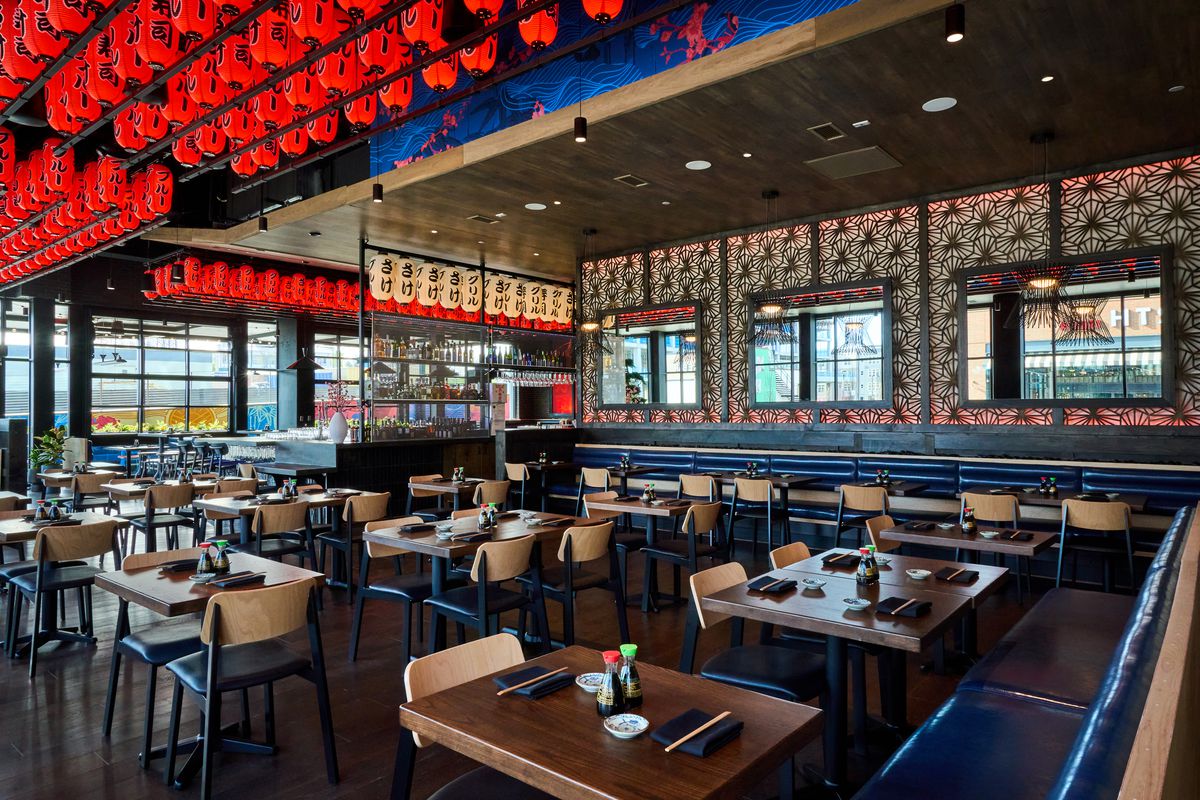
Quick hitters:
- All-you-can-eat crawfish boil at Bringle’s Smoking Oasis: On Sunday, April 7 at 11 a.m., Bringle’s is partnering with Billy Link from Louisiana for a classic crawfish boil with drink specials throughout the day. Tickets are $45 and can be purchased here.
- Dine to Shine: Lighting the Night for Nashville Children’s Alliance: Nashville Children’s Alliance will host a fundraiser on Friday, April 5 at 6 p.m. featuring a multi-course dinner from local favorites like Noko, Sean Brock, Black Box Ice Cream, East Side Banh Mi, Butcher & Bee, and the Indigo Road Hospitality Group (Oak Steakhouse, O-Ku). Tickets are still available for $150 per person and can be purchased here.
A home in Burlington re-listed for sale multiple times and eventually sold at a staggering loss shows just how prices tend to fluctuate in the GTA real estate market.
The bungalow, located at 841 Danforth Place in Burlington’s affluent LaSalle neighbourhood sold for $2.1 million in February 2022, when home prices reached an all-time peak in the GTA.
As interest rates began rapidly driving prices down further into the year, the home failed to sell when it was re-listed for a mind-boggling $3.3 million just a few months later.
Hold onto your hats! 🎩🏡 In a jaw-dropping turn of events, a home in Burlington, previously sold for a whopping $2.1 million in August 2021, has now been offloaded for just $1.4 million, resulting in a staggering loss of $700,000! 😱💸 #RealEstateShocker #HaltonRegion #GTA 🇨🇦🍁 pic.twitter.com/rMFoQsWz8Y
— Hussein E (@therealhebrahim) March 13, 2024
The home was put back up on the market just above its initial selling price at $2.2 million in April 2023, but failed to sell once again. In November 2023, the home was re-listed at a fraction of its original price at $1.5 million.
Eventually, the home sold for $1.42 million in March 2024, approximately $700,000 less than it was originally purchased for just two years earlier.
Check out the sales in the Bayview area by the lake for the last 90 days, all the homes sold below the listed price. 😮 pic.twitter.com/aaArKsCoEV
— Hussein E (@therealhebrahim) March 13, 2024
Despite this case, the Toronto Regional Real Estate Board (TRREB) found in its latest market report, that selling prices in the GTA actually edged upward in February, driven by “population growth” and a “resilient regional economy” that continued to support the overall demand for housing.
At the same time, higher borrowing costs kept home sales below the February sales record reached in 2021.
“We have recently seen a resurgence in sales activity compared to last year. The market assumption is that the Bank of Canada has finished hiking rates. Consumers are now anticipating rate cuts in the near future,” said TRREB President Jennifer Pearce.
“To minimize higher monthly payments, some buyers have likely saved up a larger down payment, chosen to purchase a less-expensive home type and/or looked to a different location in the GTA,” Pearce said.
“As we move through 2024, an increasing number of buyers will re-enter the market with adjusted housing preferences to account for higher borrowing costs,” TRREB Chief Market Analyst Jason Mercer added.
Champs Real Estate Inc. Brokerage
By Lucy Xia of RNZ
A high-profile Auckland real estate agent has been given a formal warning by her employer after posting a TikTok video of herself giving a sales pitch using a fake Asian accent.
Award-winning Ray White real estate agent Linh Yee, who is of Asian descent, also said in the video that she will do cleaning and cooking for potential buyers.
The video circulated for more than a week before it was removed, following a complaint.
While Yee spoke fluently in an official video promoting a Sandringham house, she took on a different persona in a TikTok video marketing the same property, where she called herself “Lingling” and effected an Asian accent.
The video showed Yee walking through the property, offering to do a range of household chores for potential buyers — including sweeping the deck, and crouching down to clean the floor.
“You pay me good price, I also get dirty for you, see — I clean,” she said.
She also wandered to the kitchen and said: “And when I sell your home good price, I also make you good dinner, see, peanut butter jelly, I make for you.”
The video ended with the agent saying “love you long time” — a line from the movie Full Metal Jacket in which a Vietnamese sex worker solicited American soldiers.
An Auckland woman who complained to Ray White said she felt deeply offended by the video.
“I feel like what she was doing really proliferates stereotypes against Southeast Asian women, and as someone who is of Asian descent, it was just really disappointing and sad to see,” she said.
The woman, who did not want to be named, said it normalised racism.
“This is leading to more acceptance and apathy on normalising racism in our society, and it is quite disappointing to see that Ray White doesn’t really have any formal procedures and policies for their real estate agents, to basically be posting anything they want in social media.”
She said she felt there was a wider issue of racism in New Zealand, and it was a “dark underbelly of our culture” that was not being talked about enough.
Yee would not do a recorded audio interview, but told RNZ she had no idea how much the video would offend people.
“I’m so embarrassed about what’s really going on, I’m still letting it sort of absorb in, I really, really didn’t even have any idea how much this is actually gonna offend people, when all I was doing was mocking and teasing myself,” she said.
She said on reflection she realised speaking English with a fake Asian accent was wrong and had taken down the video.
“My intention was never to cause harm or discomfort to anyone, but rather to share a light-hearted moment of self-expression and humour. However, I now understand that my actions were culturally insensitive and perpetuated harmful stereotypes,” she said.
Linh Yee said she was “truly sorry”.
“Moving forward, I am committed to educating myself and being more mindful of the impact of my words and actions. I understand that words alone cannot undo the hurt caused, but I hope to demonstrate through my future behaviour a genuine commitment to learning and growth,” she said.
Ray White Epsom director Nick Lyus said Yee has been given a formal warning about the video, which was taken down as soon as the company was made aware of it.
He said the company was committed to giving all its employees cultural sensitivity and anti-discrimination training.
Ray White said it did not vet all its staff’s social media posts, but did monitor them regularly.
Property investors to get slightly less tax relief than promised in National-Act coalition agreement
The Government has decided not to give residential property investors as much tax relief as National promised Act in the parties’ coalition agreement.
Rather than start phasing out the interest limitation rule in the current tax year, as stated in the agreement, it will start being phased out in the year to March 31, 2025.
The interest limitation rule prevents residential property investors from writing off mortgage interest as an expense when paying tax. Exclusions apply, including for new builds.
Under the existing law, introduced by the former Labour Government when the property market was overheating, no interest can be deducted for property bought from March 27, 2021.
For property bought before then, 50 per cent interest can be deducted in the current tax year, which winds up at the end of this month.
National and Act had agreed to allow investors to deduct 60 per cent of their interest in the current tax year.
Making this change would have been unorthodox, as it would have had a retrospective effect (applied to the past). Some investors would have received tax refunds.
It also would have meant the Government would not have received as much revenue as it was banking on getting.
This might have been particularly problematic in the current environment, with the sluggish economy seeing the Government collect less tax than forecast by Treasury. Indeed, Finance Minister Nicola Willis is already walking back from National’s pre-election commitment to return the books to surplus by 2026-27.
So the Government has decided to keep the rules as they are for the current tax year, then allow investors to write off 80 per cent of their mortgage interest in the year to March 2025, and all their interest in the year to March 2026.
Act leader and Associate Finance Minister David Seymour didn’t dwell on the fact he lost his battle with National on the matter, noting it was easier to avoid making a retrospective change. He didn’t mention what National might have given him to agree to deviate from the coalition agreement.
Rather, he focused on the positives for both investors and renters.
“Landlords have been hit with a double whammy of rising mortgage interest rates and increasing interest deductibility limitations during a cost-of-living crisis. These costs are inevitably passed on to tenants, one of the reasons New Zealand has all-time high rental costs,” Seymour said.
“Removing the ability for landlords to claim interest expenses made residential properties less attractive and reduced the pool of properties for tenants to choose from.”
An argument Labour made when it introduced the interest limitation rule was that it put investors on the same footing as owner-occupiers, who can’t deduct their mortgage interest as expenses to reduce their tax bills.
Investors hit back, saying that interest can normally be expensed in business, so preventing this in regard to a certain type of investment created inconsistency in the tax system.
Nonetheless, Labour’s finance spokesperson Barbara Edmonds accused the Government of abandoning first-home buyers, struggling to get ahead.
“The ripples of this decision will be felt for generations,” she said.
“Landlords will become tax cut millionaires, once again showing the Coalition Government’s priorities are a disgrace.”
Edmonds said the decision showed the priorities were “not lunches in schools, the smokefree generation or continuing the Cook Strait ferries” but “it’s mega landlords”.
“The assertion that this will bring the cost of rent down is a wolf in sheep’s clothing, there is nothing in today’s announcement that guarantees tenants will have savings passed on to them as a result,” Edmonds said.
“This tax advantage for the wealthy is not only set to be unfair for tenants, it shuts first home buyers out from getting a foot on the property ladder. Parents and grandparents who hope for their children to own their own home will realise it is a more difficult path to homeownership than ever before.”
The interest limitation rule change will be added to the Taxation (Annual Rates for 2023–24, Multinational Tax and Remedial Matters) Bill, which is currently before a select committee and is due to be passed before the end of the month.
Act had campaigned before the election on removing the interest limitation rule in one go, rather than phasing it out.
If it had its way, it would also have scrapped the bright-line test (a de facto capital gains tax on investment property), which will be reduced from 10 to two years from July 1.
“To overcome New Zealand’s many challenges there needs to be an environment where investment and development is encouraged. This [interest limitation rule] change is a step in the right direction,” Seymour said.
Jenée Tibshraeny is the Herald’s Wellington Business Editor, based in the Parliamentary press gallery. She specialises in government and Reserve Bank policymaking, economics and banking.
Aerial view from Pokeno, Auckland, where builder has put up more than 200 new residences.
South Auckland house builder Compass Homes (Franklin), which put up more than 200 new residences in Pōkeno, has gone into liquidation today.
Grant Reynolds of Newmarket has been appointed the liquidator, Companies Office
Residential property investors took out $894 million of new bank loans in December – the lowest amount for a December month since at least 2014. Photo / Mark Meredith
The change of government wasn’t enough to get investors rushing back into the residential property market – in December at least.
Residential property investors took out $894 million of new bank loans during the month.
Located in the heart of Indiana, Indianapolis is a vibrant city known for its rich history, bustling downtown, and diverse neighborhoods. Residents flock to Indianapolis for its community feel, arts and culture scene, sports teams, and more.
Whether you’re looking for the trendy vibe of Broad Ripple, the charming historic homes of Fletcher Place, or the arts district of Fountain Square, there is a neighborhood in Indianapolis for every lifestyle. For example, the average rent in Indianapolis is $1,598, while the median sale price is $230,000.
To help you find the right area to live in, Redfin is here to help you explore 18 popular Indianapolis neighborhoods. Whether you’re looking for an apartment in the heart of downtown or to buy a home in Indianapolis, let’s dive into these popular neighborhoods.
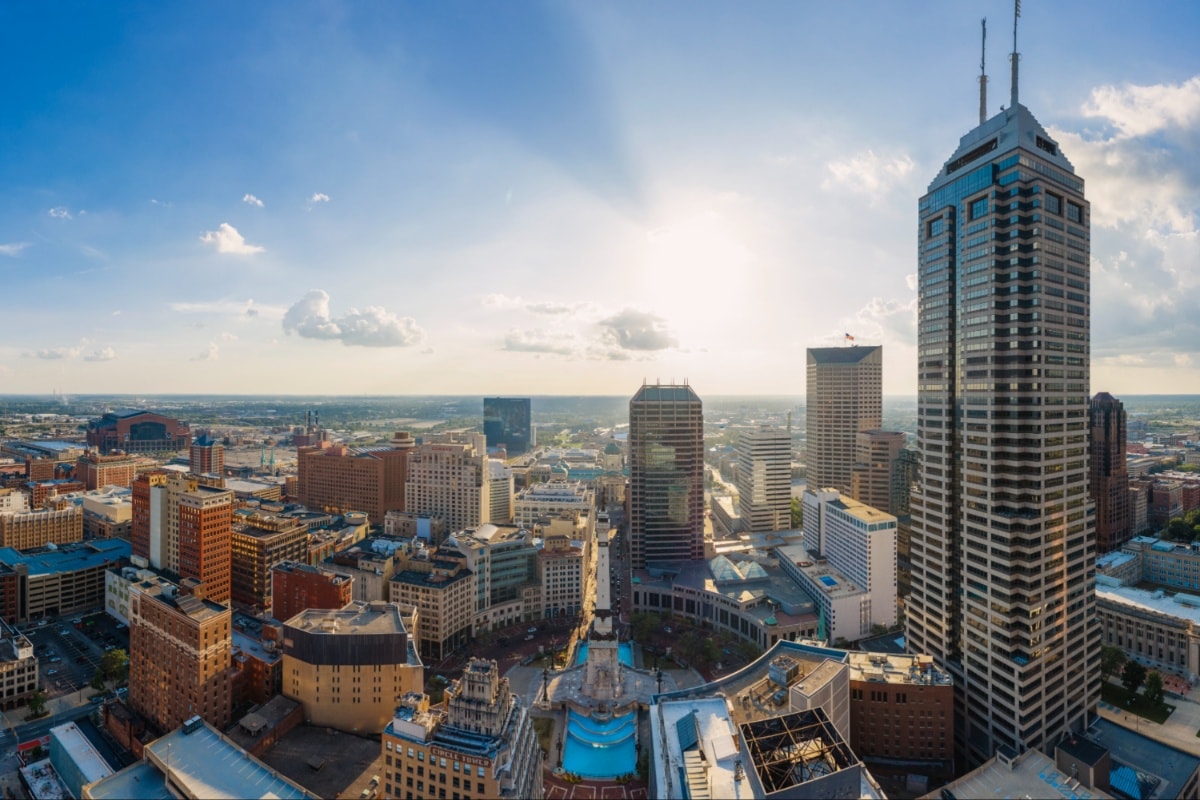
1. Broad Ripple
Broad Ripple is a vibrant neighborhood with an eclectic mix of shops, restaurants, and entertainment venues. The area is also home to the Monon Trail, a popular recreational path that attracts runners, walkers, and cyclists. Additionally, Broad Ripple features Broad Ripple Park, which offers green space, playgrounds, and sports fields. One of the historic places in the area is the Vogue Theater, a beloved music venue that has been a staple in the neighborhood for decades.
Broad Ripple offers a variety of housing types, including bungalows, cottages, and apartments in architectural styles like Tudor Revival and Craftsman.
Median Sale Price: $344,000
Homes for Sale in Broad Ripple | Apartments for Rent in Broad Ripple
2. Butler-Tarkington
The Butler-Tarkington neighborhood is on the north side of Indianapolis and is home to Butler University. This area offers a suburban feel with beautiful tree-lined streets and historic homes. Things to do in Butler-Tarkington include seeing a show at Clowes Memorial Hall and spending time outdoors in nearby Tarkington Park. Butler-Tarkington features a mix of housing types, including single-family homes and some apartments. The architectural styles range from charming Tudor Revival to Colonial Revival homes.
Median Sale Price: $290,000
Homes for Sale in Butler-Tarkington | Apartments for Rent in Butler-Tarkington
3. Castleton
The Castleton neighborhood in northeast Indianapolis offers a blend of residential living and commercial spaces. It’s home to the popular Castleton Square Mall, which provides a wide range of shopping and dining options. Castleton is also known for its numerous parks, including Sahm Park and the White River, which offer opportunities for outdoor activities. In Castleton, you’ll find various housing options, including single-family homes, townhomes, and some apartments.
Median Sale Price: $226,000
Homes for Sale in Castleton | Apartments for Rent in Castleton
4. Chatham Arch
Chatham Arch is in the heart of Indianapolis, just outside of downtown. This historic neighborhood has charming Victorian homes and proximity to downtown attractions such as the Indiana State Capitol and Lucas Oil Stadium. Residents can enjoy the nearby Mass Ave district with its eclectic mix of restaurants, shops, and theaters.
Chatham Arch features a variety of housing types and architectural styles, including beautifully restored Victorian mansions, townhouses, and modern condos. The neighborhood’s historic charm blends seamlessly with contemporary urban living.
Median Sale Price: $408,000
Average Rent 1-Bedroom Apartment: $1,175 | Average Rent 2-Bedroom Apartment: $1,140
Homes for Sale in Chatham Arch | Apartments for Rent in Chatham Arch
5. Downtown Indianapolis
Downtown Indianapolis, also called Mile Square, has a vibrant atmosphere and bustling city life. Major attractions in this neighborhood include the famous Monument Circle, which features the Soldiers & Sailors Monument, the Indiana Historical Society, the Indiana State Capitol, and Old National Centre. The area also has several beautiful parks, including University Park and the Indianapolis Canal Walk.
Downtown Indianapolis is characterized by a mix of housing types and architectural styles. You can find everything from historic apartment buildings to modern loft-style condos.
Median Sale Price: $384,000
Average Rent 1-Bedroom Apartment: $1,524 | Average Rent 2-Bedroom Apartment: $1,913
Homes for Sale in Downtown Indianapolis | Apartments for Rent in Downtown Indianapolis
6. Eagle Creek
Eagle Creek has beautiful natural surroundings, making it a excellent area for those looking to be close to nature while living in a city. It’s home to Eagle Creek Park, one of the largest city parks in the country, offering activities such as boating, fishing, hiking, and bird watching. The neighborhood is also close to the Indianapolis Motor Speedway, where the famous Indy 500 race takes place. Eagle Creek offers a variety of housing types, including single-family homes, townhouses, and apartments.
Median Sale Price: $250,000
Homes for Sale in Eagle Creek | Apartments for Rent in Eagle Creek
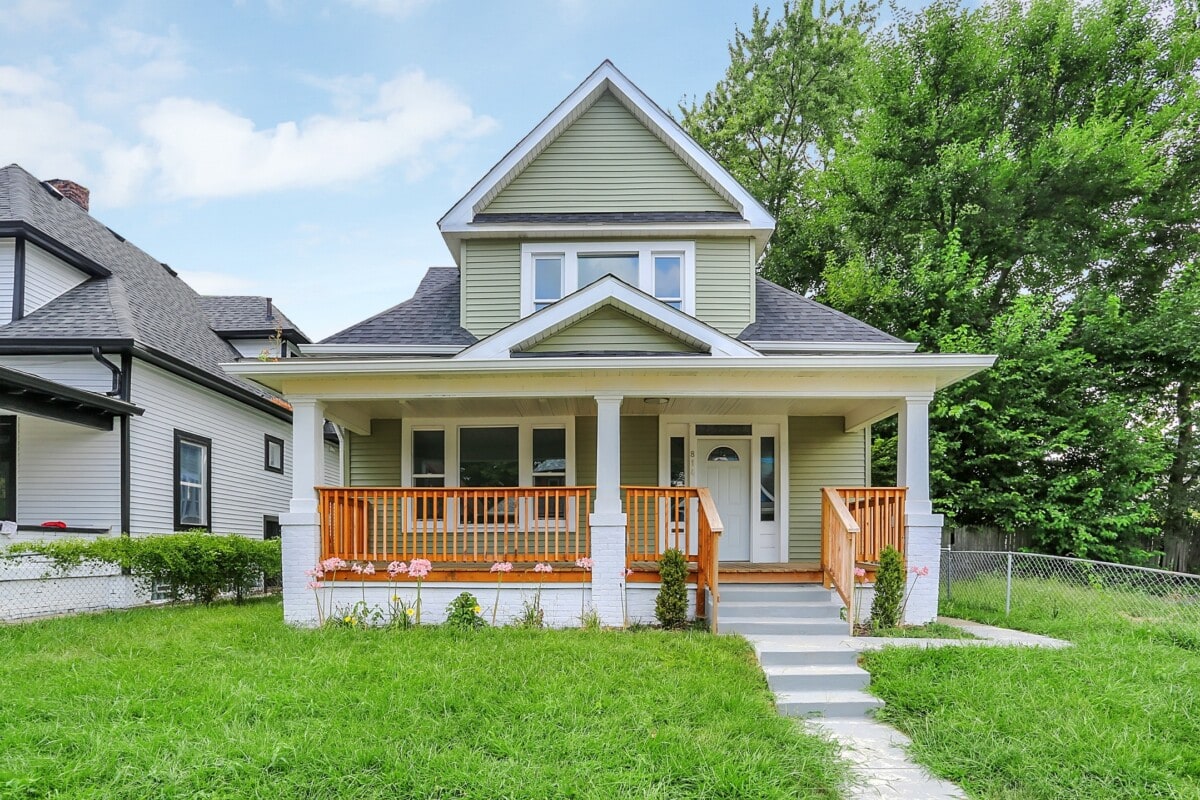
7. Fall Creek Place
Fall Creek Place has charming historic homes, tree-lined streets, and proximity to downtown. Major attractions include the Fall Creek Trail, a well-known pedestrian and biking trail. Several parks are nearby, such as Fall Creek Gardens and George E. Kessler Park.
Fall Creek Place is home to various housing types, including beautifully restored Victorian homes and modern townhouses – the architectural styles in the neighborhood range from Queen Anne and Craftsman to Colonial and Italianate.
Median Sale Price: $445,000
Homes for Sale in Fall Creek Place | Apartments for Rent in Fall Creek Place
8. Fletcher Place
Just south of downtown is Fletcher Place, highlighted by its vibrant arts and culinary scene. The neighborhood is home to a few green spaces, like Edna Balz Lacy Family Park. The housing types in Fletcher Place include a mix of historic homes, modern townhouses, and newly constructed apartments. The architectural styles range from beautifully restored Victorian houses to sleek contemporary designs.
Median Sale Price: $355,000
Average Rent 1-Bedroom Apartment: $1,590 | Average Rent 2-Bedroom Apartment: $2,420
Homes for Sale in Fletcher Place | Apartments for Rent in Fletcher Place
9. Fountain Square
Fountain Square has a historic architectural charm and quirky vibe. The neighborhood is home to a variety of restaurants, bars, art galleries, and live music venues like HI-FI Indy & HI-FI Annex. One of its major attractions is the Fountain Square Theatre Building, which houses a theater, ballroom, and duckpin bowling alley. The neighborhood is also home to the Pleasant Run Trail. Fountain Square offers a blend of housing types and architectural styles, including historic Victorian homes and modern new builds.
Median Sale Price: $285,000
Average Rent 1-Bedroom Apartment: $1,548 | Average Rent 2-Bedroom Apartment: $2,393
Homes for Sale in Fountain Square | Apartments for Rent in Fountain Square
10. Garfield Park
Garfield Park is located south of downtown Indianapolis and is home to a beautiful park of the same name. The park features a conservatory, sunken gardens, a fountain, and a playground. In addition to the park, Garfield Park also offers historic places such as the Garfield Park Arts Center (GPAC), which features art exhibitions and classes. Garfield Park offers a variety of housing types, including single-family homes and apartments, ranging in styles from Craftsman to Colonial Revival.
Median Sale Price: $196,950
Homes for Sale in Garfield Park | Apartments for Rent in Garfield Park
11. Herron-Morton Place
The Herron-Morton Place area is filled with historic architecture and tree-lined streets. The neighborhood is home to several major attractions, including the Herron-Morton Place Park and the Footlite Musicals. There are also many historic places within walking distance such as the Old Northside Historic District.
The housing types in Herron-Morton Place include beautifully restored Victorian and Queen Anne-style homes, along with some newer construction. The neighborhood offers a mix of single-family homes and townhouses, making it a great place to live for those who appreciate historic charm and modern amenities.
Median Sale Price: $495,000
Homes for Sale in Herron-Morton Place | Apartments for Rent in Herron-Morton Place
12. Holy Cross
Holy Cross is east of downtown and full of charm. The area also has several parks, including Highland Park and the Monon Trail. Holy Cross is filled with beautifully restored homes and showcases a mix of architectural styles, including Victorian, Queen Anne, and Italianate.
Median Sale Price: $420,000
Homes for Sale in Holy Cross | Apartments for Rent in Holy Cross

13. Irvington
Irvington is located on the east side of Indianapolis. It is known for the Irving Theatre, which hosts live performances and film screenings, and the Irvington Halloween Festival, a popular annual event. The neighborhood has several parks, including Ellenberger Park, which features a swimming pool, tennis courts, and a playground. Historic places in Irvington include the Benton House, a Victorian-era home that is now a museum.
Irvington offers a variety of housing types, including historic bungalows, Tudor-style homes, and Victorian houses. The architectural styles in the neighborhood range from Craftsman and Colonial Revival to Queen Anne and Gothic Revival.
Median Sale Price: $214,900
Average Rent 1-Bedroom Apartment: $750 | Average Rent 2-Bedroom Apartment: $799
Homes for Sale in Irvington | Apartments for Rent in Irvington
14. Mapleton-Fall Creek
Mapleton-Fall Creek is located in the northeast part of Indianapolis. The area is near the Children’s Museum of Indianapolis and the Indiana State Fairgrounds. Mapleton-Fall Creek features a mix of housing types, including single-family homes, apartments, and townhouses. For example, the architectural styles in the neighborhood range from Victorian and Craftsman, to Colonial and bungalow-style homes.
Median Sale Price: $330,000
Average Rent 1-Bedroom Apartment: $1,295 | Average Rent 2-Bedroom Apartment: $1,645
Homes for Sale in Mapleton-Fall Creek | Apartments for Rent in Mapleton-Fall Creek
15. Mass Ave
Mass Ave is located in downtown Indianapolis and is known for its lively arts and culture scene. It’s home to numerous art galleries, theaters, and trendy boutiques. The neighborhood is also famous for its historic landmarks, such as the Athenaeum, a German-American building that hosts events and houses a theater. The housing types in Mass Ave consist of mainly apartments and lofts, many of which feature unique architectural styles, such as Victorian and Art Deco influences.
Median Sale Price: $420,235
Average Rent 1-Bedroom Apartment: $1,454 | Average Rent 2-Bedroom Apartment: $2,045
Homes for Sale in Mass Ave | Apartments for Rent in Mass Ave

16. Meridian-Kessler
Meridian-Kessler is home to several major attractions, such as the Indianapolis Opera, and plenty of excellent local restaurants. You’ll find charming bungalows, Tudor-style homes, and Colonial Revival houses throughout the Meridian-Kessler neighborhood.
Median Sale Price: $463,500
Average Rent 1-Bedroom Apartment: $1,375 | Average Rent 2-Bedroom Apartment: $1,791
Homes for Sale in Meridian-Kessler | Apartments for Rent in Meridian-Kessler
17. Near Northside
The Near Northside is a large neighborhood just north of downtown Indianapolis. Some major attractions in the area include the Benjamin Harrison Presidential Site, the 23rd President’s home, which features exhibits and tours. The neighborhood also offers several parks for outdoor activities, such as Dr. Martin Luther King Jr. Park. Near Northside also has many historic places, including the Old Northside Historic District. The housing types in Near Northside vary, with a mix of single-family homes, townhouses, and apartments in styles ranging from Victorian to Craftsman.
Median Sale Price: $400,000
Average Rent 1-Bedroom Apartment: $1,319 | Average Rent 2-Bedroom Apartment: $1,717
Homes for Sale in Near Northside | Apartments for Rent in Near Northside
18. St. Joseph
St. Joseph is known for its close proximity to downtown. There are many historic sites in the area, like Calvin I. Fletcher House and the nearby American Legion Mall. St. Joseph offers plenty of housing options, including single-family homes, townhouses, and apartments. The architectural styles in the neighborhood vary, with a combination of historic houses and modern developments.
Median Sale Price: $299,000
Homes for Sale in St. Joseph | Apartments for Rent in St. Joseph
Methodology: All neighborhoods must be listed as a “neighborhood” on Redfin.com. Median home sale price data from the Redfin Data Center during September 2023. Average rental data from Rent.com during September 2023.

